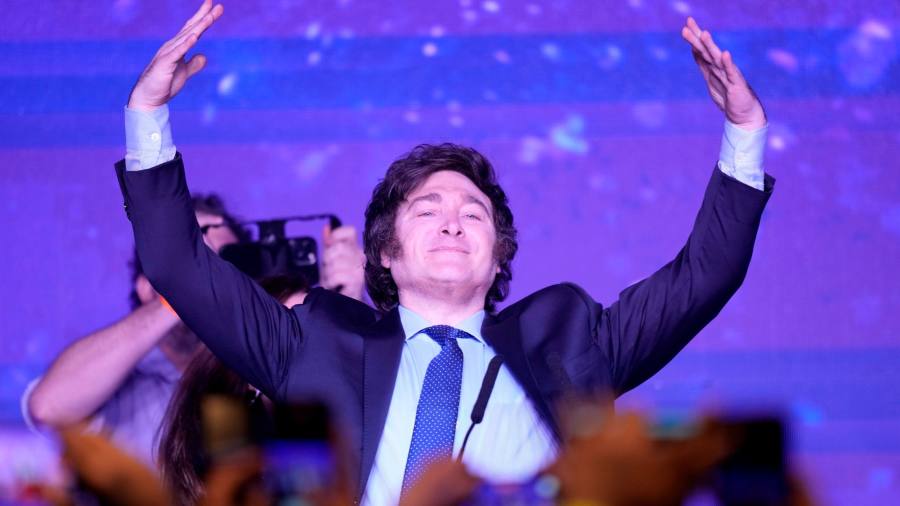Receive free Argentine politics updates
We’ll send you a myFT Daily Digest email rounding up the latest Argentine politics news every morning.
Argentina’s upcoming presidential election has been plunged into uncertainty after outsider candidate Javier Milei, a radical libertarian economist, came first in a primary poll on Sunday, indicating a strong shift to the right in the South American country.
Milei, a former television personality and one-term congressional representative who has called for extreme austerity and dollarising Argentina’s economy, won 30.1 per cent of the vote, surpassing pollsters’ average forecast of 20 per cent, with 96 per cent of votes counted.
That put his Freedom Advances party ahead of centre-right force Together for Change, with 28.3 per cent, and the ruling populist coalition Union for the Homeland, whose candidate is centrist economy minister Sergio Massa, which earned 27.2 per cent.
“We will put an end to Kirchnerism and the parasitic, thieving political class that is sinking this country,” Milei said, referencing a leftist populist strain within Union for the Homeland that is influenced by former president Cristina Fernández de Kirchner.
Argentina’s unusual primary system, in which voting is mandatory, offers a closely watched indication of overall support in a country where opinion polling is unreliable.
Voters also backed a rightwing candidate to represent Together for Change, Patricia Bullrich, a hardline former security minister who has promised to aggressively dismantle the legacy of the incumbent populist government. Bullrich won 17 per cent, defeating her more moderate colleague, Buenos Aires mayor Horacio Rodríguez Larreta, with 11.3 per cent.
Milei’s unexpectedly strong performance was a clear signal of Argentines’ frustration with the failure of recent governments to deliver lasting economic stability, said Juan Cruz Díaz, managing director of Buenos Aires-based political consultancy Cefeidas Group. Together for Change, which governed from 2015 to 2019, “is struggling to capture that sentiment”, he said. “Milei connected with it.”
The split primary result will also deepen anxiety around Argentina’s extremely fragile economy. Inflation is running above 115 per cent, foreign exchange reserves are at dangerously low levels and the peso has lost more than half of its value against the dollar over the past 12 months. Four in 10 Argentines are living in poverty.
While a victory in October for Milei, who has little in the way of a national political structure, is far from assured, his surprise success will shake up the race, analysts said, threatening to foil Bullrich’s path to the presidency. Both candidates appeal to a similar rightwing sector of the electorate, while a split could benefit Massa.
Incumbent president Alberto Fernández and Kirchner, his deputy, are not contesting the polls.
Most investors favour Together for Change, which has promised to swiftly impose orthodox measures to stabilise the economy. But to regain momentum, the party will need to quickly win over Larreta’s more moderate supporters, Diaz said.
Analysts expect Massa will slow-walk reforms such as spending cuts and removing capital controls to avoid losing support from the Peronist left flank, while experts say Milei’s controversial plans to dollarise the economy to fight inflation and dramatically shrink the state will be disruptive.
Martín Rapetti, director of economics consultancy Equilibra, said the primary result would accelerate inflation and drag down bond prices, which have risen in recent months amid expectations of a win for Together for Change. “Difficult weeks are coming, which will create problems for the government,” he said.
The IMF’s board is due to meet in the next two weeks to approve a $7.5bn loan disbursement provisionally agreed last month. Argentina has failed to meet crucial targets on cutting its fiscal deficit and building up foreign reserves under its $44bn arrangement with the fund.
In an interview with the Financial Times this month, Milei said that if elected, he would “overshoot all the targets” in the IMF deal, calling the fund’s spending cuts “tiny” compared with the country’s needs.
Read the full article here




